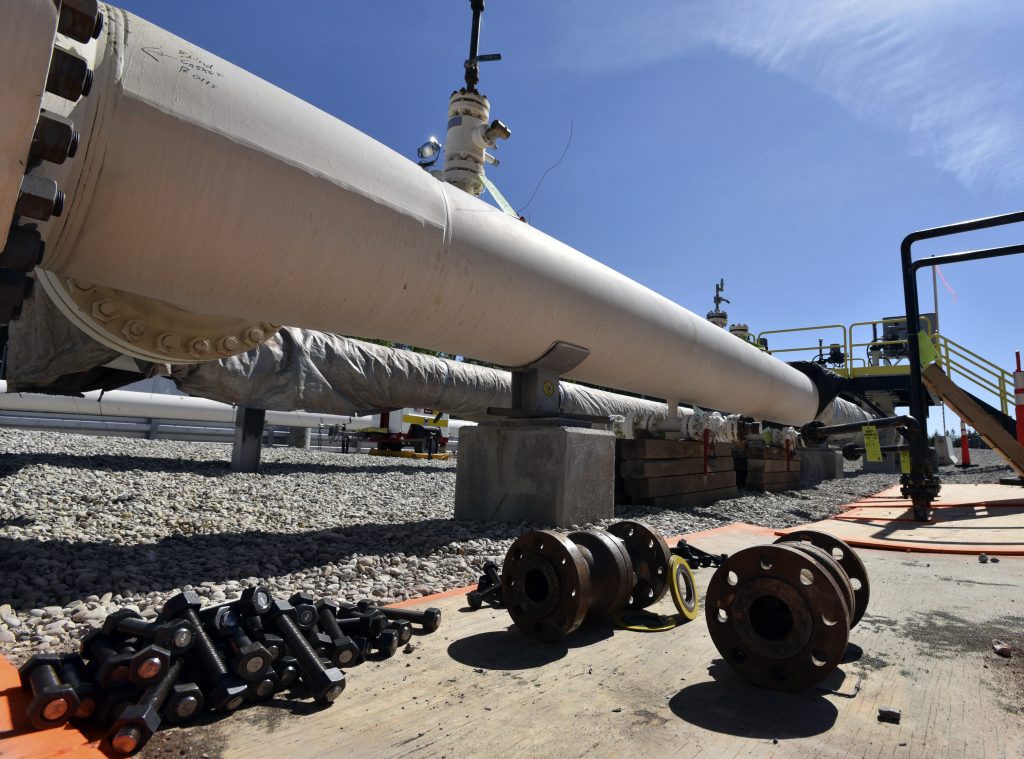Canada News
Still ‘non-negotiable’: Canada’s natural resources minister redraws line on Line 5

WASHINGTON — Natural Resources Minister Jonathan Wilkinson is doubling down on Canada’s assertion that the continuing operation of the Line 5 pipeline is “non-negotiable.”
Wilkinson made the comments Friday in the House of Commons as Opposition MPs seized on media reports that the controversial cross-border pipeline is facing yet another court challenge.
On top of efforts by the state of Michigan to shut down Line 5, an Indigenous band in Wisconsin is now asking a judge there to do the same.
The Bad River Band of Lake Superior Tribe of Chippewa argues in court documents that Enbridge Inc., the pipeline’s owner, no longer has the right to operate on its territory.
Fifteen of the 20-year easements that allowed the company to operate on band territory expired back in 2013 and were never properly renewed, they argue in court documents.
“Enbridge has continued to operate the pipeline as if it has an indefinite entitlement to do so,” say the documents, first reported by the Globe and Mail.
“This constitutes an unlawful possession of the subject lands, and an intentional, ongoing trespass upon them.”
The band filed a motion in February seeking a summary judgment against Enbridge — in other words, to shut down Line 5 without a trial.
“The continued operation of Line 5 is non-negotiable,” Wilkinson said Friday in response to a question from Conservative MP John Brassard.
“We will take appropriate steps to ensure the continued safe operation of this critical infrastructure. And we continue to work closely with the owner of Line 5.”
Wilkinson said he will continue to raise the matter in discussions with his U.S. counterparts. Federal officials say the minister will be in D.C. for meetings on a number of bilateral issues in the coming days, potentially as early as next week.
The Conservatives, however, want the government to take a harder line, urging Foreign Affairs Minister Mélanie Joly to intervene in the Wisconsin case the same way they did in Michigan: with an amicus brief to put Canada’s economic interests on the record.
“As before, the government needs to take a ‘Team Canada’ approach to combat this latest legal challenge to an international pipeline that is critical to our nation,” Conservative MPs Greg McLean and Marilyn Gladu wrote in a letter to Joly earlier this week.
“We call on you to fully advocate and support Canada’s interest once again, by filing an amicus brief and ensuring the terms of the 1977 Transit Pipeline Treaty are respected.”
Enbridge, meanwhile, is in the process of trying to relocate the pipeline away from band territory, said spokesman Jesse Semko, adding that a 1992 agreement with the Bad River Band allows for operations to continue until 2043.
That relocation project will involve a Wisconsin contractor and union and Indigenous labour, as well as $46 million spent specifically on Indigenous businesses and communities in the area, Semko said.
“Agreement has been reached with 100 per cent of private landowners along the re-route, which was chosen because it minimizes environmental impacts and protects critical resources.”
The Wisconsin challenge comes as Enbridge tries to fend off Michigan Gov. Gretchen Whitmer, who fears an ecological disaster in the Straits of Mackinac, where the twin lines cross the Great Lakes.
Enbridge insists the pipeline is safe and has already received a level of state approval for a $500-million concrete tunnel beneath the straits that would house the line’s twin pipes and protect them from anchor strikes.
In the Michigan case, Canada has invoked a 1977 bilateral pipelines treaty aimed at ensuring the uninterrupted flow of energy between the two countries, and has petitioned the court there to allow those talks to play out.
It’s not yet clear whether the federal Liberal government will do so again in the Wisconsin matter, although it would likely require a separate set of negotiations, Semko added.
“Given Line 5’s volumes, there are no easy alternatives for the upper U.S. Midwest and Canada,” he said in a statement.
“Moving the same volumes by truck or train would require more trucks and train cars than are currently available, would cost substantially more, and would burn more fuel in order to move it.”
This report by The Canadian Press was first published May 6, 2022.
James McCarten, The Canadian Press





















